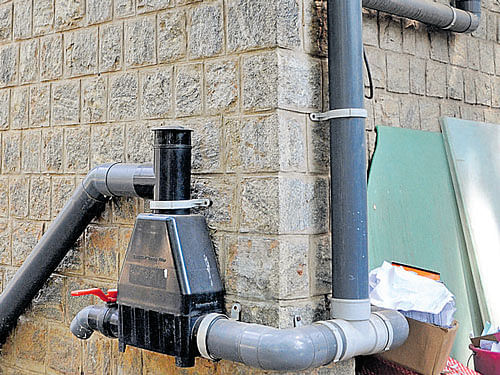
Even after a record 277 mm rainfall in the month of November, the highest for the month in the past 100 years, neither the Bangalore Water Supply and Sewerage Board (BWSSB) nor most Bengalureans could make the best use of it in terms of conserving rain water
.
With more than half of City’s individual houses and commercial buildings not installing rain water harvesting (RWH) facility, the rainwater has gone down the drain.
As of now, RWH has been installed in 55,578 buildings in the City. This includes 45,143 domestic houses, 6,011 commercial establishments, 4,023 apartments as well as non-domestic (ND) buildings and 328 government buildings. In addition, the Bruhat Bangalore Mahanagara Palike (BBMP) has installed structures to harvest rainwater in a few parks.
However, the number is far less in comparison to the total number of buildings in the City.
Going by November rains, every 60x40 sq ft house with RWH facility could have stored or harvested at least 49,500 litres of rainwater and 30x40 sq ft houses could have saved 27,500 litres of water. Moreover, the water consumption of every house with average of four members is around 1,500 litres a month.
“This means, the house with RWH facility need not depend or pay for the water pumped from elsewhere,” a senior BWSSB official pointed out. He said that it does not cost much to instal RWH facility.
“To those who already have a sump, it only involves an initial expenditure of Rs 5,000 to Rs 8,000 on pipelines and water filter, depending on the dimension of the building”, the official added. BWSSB Chairman T M Vijaya Bhaskar said that harvesting rain water is mandatory for sites of 60x40 sq ft and above, which were constructed prior to 2009 and sites of 40x30 sq ft and above, which are built after 2009. If not followed, water connections will not be given to these houses.
About 7,200 houses were exempted with a written undertaking that they will install the facility soon.
Apart from this, many houses located in City and Town Municipal Council limits do not have RWH facility. “Meanwhile, we have sent a proposal to the State government to allow us for levying penalty up to 25% on the water bill (on houses without RWH facility). We are waiting for its approval”, the official said and added that BWSSB will conduct a fresh study to ascertain the number of houses without RWH
facility.